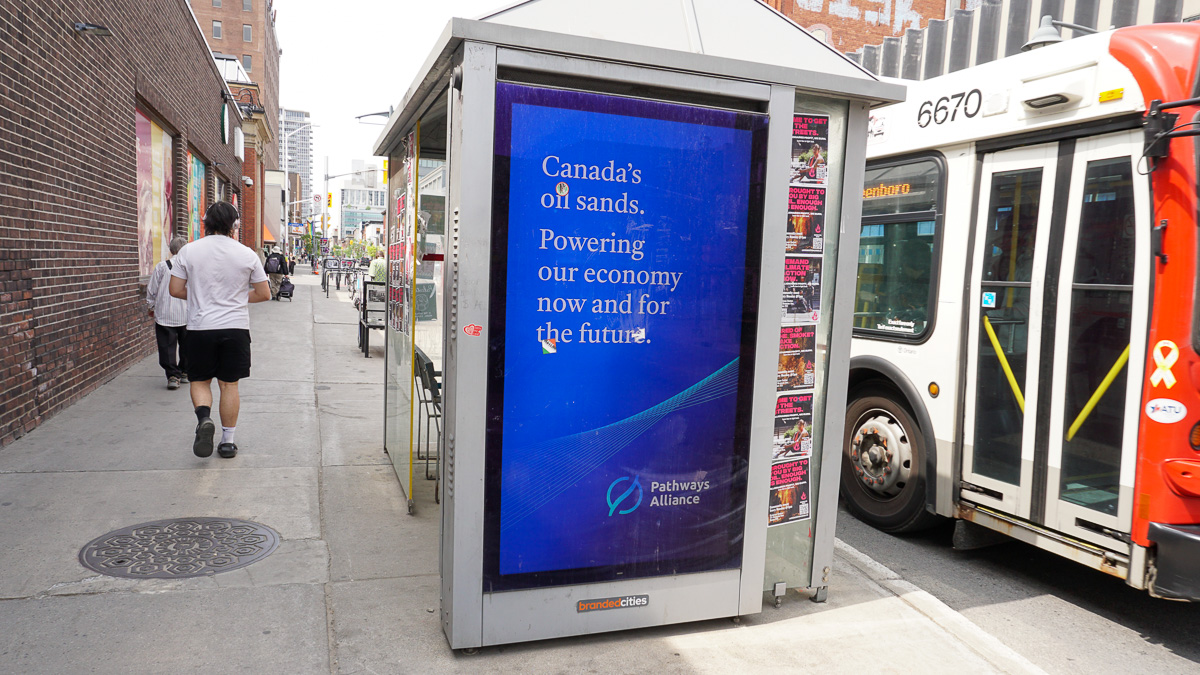Members of the city’s finance and corporate services committee have delayed debating a staff recommendation against banning fossil fuel advertising on municipal property.
Instead, staff outlined a plan in a memo presented to the committee on June 3 to ensure ads on city property would comply with new provisions under the Federal Competition Act targeting misleading environmental claims, also known as “greenwashing.”
This was in response to a proposal brought forward by Capital Coun. Shawn Menard in March 2024. It asked staff to consider options for rejecting fuel advocacy in city-owned advertising space, taking into account the alignment of city policies on combatting climate change and lowering greenhouse gas emissions, as well as possible reputational risks and legal implications.
‘The top line for me is that I think the city is taking a very measured approach to it, and I think that they’re right in doing so.’
— Helen Tooze, senior policy researcher, Canada Climate Law Initiative
One legal expert described the city’s approach as “measured” in light of recent challenges from the fossil fuel sector on these new federal rules. Still, advocates continue to push for a legal path toward a ban based on the health and environmental impacts posed by the climate crisis, which scientists have long agreed is being caused by human activity.
In April 2019, the City of Ottawa declared a climate emergency.
Expert: City finds balance in plan
Helen Tooze, a senior policy researcher at the Vancouver-based Canada Climate Law Initiative, recently published a deep dive into changes to the Competition Act. She emphasized the challenge of an outright ban on fossil fuel ads due to the freedom of expression granted to advertisers under Section 2(b) of the Canadian Charter of Rights and Freedom.
“The top line for me is that I think the city is taking a very measured approach to it, and I think that they’re right in doing so,” she said.
Tooze also described the steps for ad screening outlined in the staff overview of city policies as “going over and beyond.”
The city, she said, is finding a really, really good balance here to make sure that there aren’t adverts going out that could be harmful or could be misleading, and while staying within the Charter of Rights and Freedoms.”

As outlined in the staff memo, advertisers seeking space on city property must now demonstrate that any environmental claims made in ads are based on adequate testing or can otherwise be substantiated. The plan would also allow any person, including advocacy groups, to bring complaints about a deceptive ad before the federal Competition Tribunal, which could result in a significant fine for an advertiser that contravenes standards.
In October 2024, the City of Toronto voted to move toward a more comprehensive ban on fossil fuel advocacy ads that don’t comply with its municipal net-zero plan, TransformTO.
In the context of staff not recommending an outright ban, the memo referenced a constitutional legal challenge to these new federal greenwashing regulations brought forward by Alberta Enterprise Group and the Independent Contractors Business Association.
The Pathways Alliance, a group of Canada’s biggest oil sands producers, scrubbed its website of any reference to its net-zero goals last year when the Competition Bureau first launched these regulations.
“We believe the amendments to the Competition Act related to environmental claims should be removed to allow businesses to speak openly and truthfully about what they are doing to improve environmental performance and without fear of meritless litigation by private entities,” said Pathways president Kendall Dilling last week, according to a Reuters report.
Advocates: A step in the right direction, but further to go
Leah Temper, the director of the health and economic policy program at the Canadian Association of Physicians for the Environment, which had planned to present its views to the committee when the issue was originally scheduled for debate, said she found the city’s memo “disappointing.”
“We don’t feel that the memo actually engages with what the motion asked it to do,” said Temper. “It doesn’t substantially discuss whether fossil fuel advocacy advertising is consistent with the city’s vision, mission and values, and whether the ads compromise or contradict the city’s policies.”
Temper said her organization envisions a ban on fossil fuel advertising on similar grounds as advertising bans faced by the tobacco industry.
Ottawa’s corporate sponsorship and advertising policy already bans advertising of weapons, tobacco and pornography.
“We know that the health impacts are far more severe and widespread (from climate change) than other products that (the city) has already taken action to ban advertising on,” she said.
Tooze, however, warned that establishing legal causation between negative health impacts and the fossil fuel industry would be challenging in the Canadian context.
Tom Ledgley, Horizon Ottawa’s coordinator, said although he would “love to see” the city adopt a policy where it would not enter into any advertising agreements with extractive industries, he acknowledges that’s pretty much a “pipe dream.”
Ledgley added that testing ads against greenwashing regulations is a step in the right direction, but expressed frustration at the delay in the broader issue of a possible ban on fossil fuel making its way to committee.
“(We are) advocating for something that we believe is possible for city council to pass — something that we can get the majority of members supporting,” he said.
The motion is scheduled to be discussed by the environment and climate change committee on June 17.




